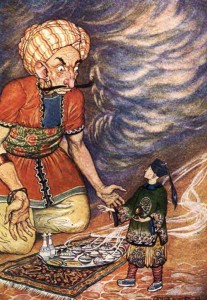Aladdin’s Marriage to the Sultan’s Daughter
One day, the Sultan’s daughter, Lady Badr al-Budur, desired to visit the public baths. The merchants all closed shop so that she would have her privacy, but Aladdin hid behind the door of the bathhouse in order to catch a glimpse of her beauty. Upon seeing her face, Aladdin fell in love with the Sultan’s daughter, and spent the rest of the day in a daze. When his mother threatened to call a doctor, Aladdin told her what had happened and that he resolved to ask for the princess’s hand in marriage.
Aladdin sent his mother to ask the Sultan, bearing a gift of jewels gathered from the cavern. After a month of trying, Aladdin’s mother was given an audience with the Sultan. Laughing at her request, the Sultan asked to see what she carried with her. When the Sultan saw the jewels, he would have agreed right then, but the Wazir requested a delay of three months in order to allow his own son to present a gift of equal value.
A short time later, Aladdin’s mother discovered the Sultan was preparing to marry his daughter to the Wezir’s son. Aladdin called forth the Jinni of the lamp to help him stop the marriage. When the bridge and bridegroom went to bed that night, the Jinni bore their bed to Aladdin’s room, where Aladdin had the Wezir’s son placed in the outhouse to sleep for the night. Aladdin explained the Sultan’s promise to Badr al-Budur, and lay beside her on the bed with a scimitar placed between them.
When the morning came, the Jinni restored the couple to their bedroom. The Sultan asked how their night was, but the princess refused to answer, giving him an angry look. When the queen visited her daughter, the princess told her the whole story. The queen counseled her to tell no one, and convinced her to leave her room and join the bridal festivities.
That night, the Jinni again brought the couple to Aladdin’s room, and the events of the previous night were repeated. When the the princess again refused to answer the Sultan, he grew angry and drew his blade. She then told him the story, and the Sultan promised to set a guard for the night. When the Wezir confronted his son, he asked to be set free from the marriage. The Wezir convinced him to see what the coming night would bring, but the Sultan cancelled the wedding before the night came.
The three months passed, and Aladdin sent his mother to remind the Sultan of his promise. The Sultan agreed, on condition that Aladdin would provide him with forty gold platters loaded with gems, borne by forty white slave girls and forty black eunuch slaves. When Aladdin learned of the Sultan’s condition, he again called forth the Jinni of the lamp. The Jinni brought the requested jewels and slaves, and Aladdin immediately sent his mother to the Sultan with the required dowry.
The Sultan was awed by the sight of the dowry, and agreed to keep his bargain. He proclaimed that the marriage would take place that night, and commanded Aladdin to come to him at once. The Jinni took Aladdin to a bath and dressed him in the finest clothing, and provided him with a royal entourage to accompany him to the palace. Arriving at the palace, Aladdin was seated on the Sultan’s right.
After the wedding feast Aladdin rose, intending to build a home for the Lady Badr al-Budur. The Sultan gave Aladdin whichever spot of land he wished, and Aladdin had the Jinni build on the broad plain facing the palace. When the Sultan arose the next morning, he opened his window to find that Aladdin’s palace was finished. When the princess arrived at Aladdin’s palace that night, she marveled at the beauty of the decorations.
The next morning, Aladdin arose and visited the Sultan, inviting him to dinner. Upon arriving at the palace, the Sultan was also amazed at the construction and beauty. While exploring, the Sultan discovered a window which Aladdin had requested be left unfinished. When asked the reason for the unfinished window, Aladdin replied that due to the suddenness of the wedding he was unable to find artists to finish it. The Sultan decided to finish it himself, but his artisans were unable to duplicate the fine work of the rest of Aladdin’s palace. When Aladdin saw their work, he commanded the artisans to restore the jewels they had used to their previous owners, finishing the window himself.
SOURCES:
This article originally appeared 4 June 2011 on mythsoftheworld.blogspot.com

